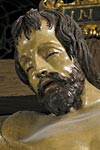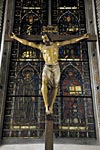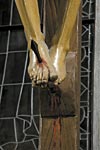Donato di Niccolò Bardi, known as
Donatello
(Florence, ca. 1386-1466)
Crucifix
ca. 1406-1408
wood
Florence, Church of Santa Croce, Ministry of the Interior - FEC
 The work is recorded as being by Donatello in all
the ancient sources beginning with Francesco Albertini
(1510), commissioned, as Francesco Bocchi wrote in 1591
by “Bernardo or Niccolò del Barbigia” for the altar
against the rood screen of the Santa Croce choir. After
demolishing this wall, during the Vasari renovation,
which separated the monks’ choir from the space in the
nave reserved for the faithful in this Franciscan
basilica as in many other medieval churches, the
Crucifix was transferred into the chapel for many years
patronized by the Bardi family in the left end of the
transept, where it is still found today.
The work is recorded as being by Donatello in all
the ancient sources beginning with Francesco Albertini
(1510), commissioned, as Francesco Bocchi wrote in 1591
by “Bernardo or Niccolò del Barbigia” for the altar
against the rood screen of the Santa Croce choir. After
demolishing this wall, during the Vasari renovation,
which separated the monks’ choir from the space in the
nave reserved for the faithful in this Franciscan
basilica as in many other medieval churches, the
Crucifix was transferred into the chapel for many years
patronized by the Bardi family in the left end of the
transept, where it is still found today.
 Donatello’s debt to Lorenzo Ghiberti is very
obvious (he had worked with him on the bronze reliefs
for the north door of the Florentine Baptistery between
1404 and 1407) in the elongation of the figure, the
naturalness of the skin accentuated by the original
polychromy and, especially, in the folds of the sharp
rhythmic progressions of the long loincloth. We are
thus at the debut of the young artist, little more than
twenty years old, and yet the experience developed at
the side of the older master was already heading in the
direction of a new and powerful expressivity that would
mark Donatello’s entire production.
Donatello’s debt to Lorenzo Ghiberti is very
obvious (he had worked with him on the bronze reliefs
for the north door of the Florentine Baptistery between
1404 and 1407) in the elongation of the figure, the
naturalness of the skin accentuated by the original
polychromy and, especially, in the folds of the sharp
rhythmic progressions of the long loincloth. We are
thus at the debut of the young artist, little more than
twenty years old, and yet the experience developed at
the side of the older master was already heading in the
direction of a new and powerful expressivity that would
mark Donatello’s entire production.
 The sculptor modeled the limbs of the strong body
heightening the tensions (with the mobile arms to be
placed along the sides once Christ was deposed from the
cross and placed “in pietà” in the sepulcher during
Holy Week or during processions) and he accentuated the
agonized suffering in the face, made clear by the
sinking of the head between the shoulders, with the
locks of hair seemingly soaked in sweat. The criticism
of Brunelleschi, (namely, that “he had put a peasant on
the cross”) who instead already aspired to a superior
classical balance, is easy to understand in front of so
much expressivity.
The sculptor modeled the limbs of the strong body
heightening the tensions (with the mobile arms to be
placed along the sides once Christ was deposed from the
cross and placed “in pietà” in the sepulcher during
Holy Week or during processions) and he accentuated the
agonized suffering in the face, made clear by the
sinking of the head between the shoulders, with the
locks of hair seemingly soaked in sweat. The criticism
of Brunelleschi, (namely, that “he had put a peasant on
the cross”) who instead already aspired to a superior
classical balance, is easy to understand in front of so
much expressivity.
(Florence, ca. 1386-1466)
Crucifix
ca. 1406-1408
wood
Florence, Church of Santa Croce, Ministry of the Interior - FEC


